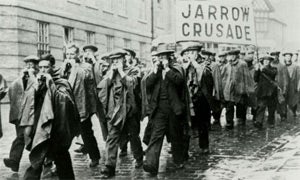Last Night's TV: The British at Work/BBC2<br />Love Thy Neighbour/Channel 4

Towards the end of his second term, while reeling from public anger over the Iraq war, Tony Blair did a curious thing. He used the announcement of a new crackdown against crime to start a debate about the role of the 1960s in our culture.
Inveighing against that ever-ready phantom, the 1960s "liberal consensus", Mr Blair said it was time we confronted the law and order problems it had bestowed on us. Nor was the 1960s anything like the flower power brigade would have us believe, he argued. Far from being one long summer of love, Mr Blair said, the decade should be seen as mixed blessing.
Great advances were made in equalising opportunities and extending precious freedoms. But it was also a time of stubborn inflation, constant industrial dispute, and Britain being labelled the sick man of Europe. On this line of thinking, the 1960s began an economic stagnation that culminated in the Winter of Discontent. Sure, meritocracy had marched hesitantly on, and unworthy deference had declined; but "meanwhile, some took the freedom without the responsibility".
As with many of Mr Blair's cultural proclamations, this view would soon become the prevailing orthodoxy. He was understood as saying, in political terms, that though at the time the Left clearly won the cultural argument, in retrospect they completely lost the economic one. And now maybe they should be relieved of the cultural prize too.
For those of us who weren't around for all the free love it's hard to know where to stand in this debate. But a better guide than Kirsty Young provided last night could hardly be imagined; and though she was studiously neutral in her politics, as the BBC would want, you got the sense that by the end she was strengthening Mr Blair's argument rather than weakening it.
She certainly addressed his concerns very directly. Last week, the first part of this series documented how Britain's wartime slogan, "We Can Take It", was adapted in the post-war years to "We Can Make It", and in that single transferred consonant was a bold declaration of our reliance on manufacturing, as well as an insight into British stoicism. This week, we began to see the consequences of the great egalitarian thrust of post-war governments.
So in another set of endearing interviews, now with many more women, we had a sense of female emancipation – in the workplace. This irony was far from lost on our presenter, who made the point that there was something charming about women asking for the right to work as many hours as men, if that meant they could have as big a slice of the financial pie. One consequence of this was that a bigger supply of labour boosted productivity. But when that labour force asked en masse for higher wages, a wage-price spiral set in, and the inflation monster would prove difficult to tame.
Again there was clever use of archive footage, and a helpful dash of Young's family history, but the soundtrack was much too literal. Shipbuilders on the Clyde were exhibited to the tune of John Lennon's "Power to the People"; American enterprise was given the Steve Miller Band's "Fly Like an Eagle"; and bossy managers and bureaucrats received Jethro Tull's "Living in the Past". Subtle association this wasn't.
If one important lesson is learned from this series, I hope it concerns how misunderstood unions now are – not trade unions, but unions. As Young showed, long before the Winter of Discontent forever tainted them with militancy and public disruption, unions were institutions born of trust and common affections. They were vessels for solidarity, often very conservative, and not merely instruments of political agitation.

Watch Apple TV+ free for 7 days
New subscribers only. £8.99/mo. after free trial. Plan auto-renews until cancelled

Watch Apple TV+ free for 7 days
New subscribers only. £8.99/mo. after free trial. Plan auto-renews until cancelled
The period covered by this show was one in which unions went from embodying the post-war spirit of national pride and diligence to becoming – in the public's imagination – sworn enemies of enterprise and industry. In other words, they went from preventing social atomisation to being blamed for it. Maybe it was just her East Kilbride accent, but you got the strong sense that Young regretted all this too.
If anywhere could still boast a sense of social solidarity, it ought, of course, to be Grassington in the Yorkshire Dales. Even the name sounds so English and homely as to evoke shared membership of one big happy family. In the third instalment of Love Thy Neighbour, in which a dozen families compete for a chance to move into a £300,000 cottage in the village, eco-worriers Kate and Corwen went up against consumer-crazy Jay and Steph.
It's the easiest trick in television: put very different characters into the same small space, and watch the fireworks go (think Big Brother). But there was a charm to proceedings, because despite being a small and self-contained community – with solid Tory credentials, naturally – there was a real willingness to engage with the newcomers. In this spirit, Jay and Steph had the advantage of their children, which caused a local doctor to remark: "It would be lovely to increase the gene pool a bit."
Others were more resistant; but several had the good grace to admit that their nimbyism carried costs. If in the end their small-mindedness prevailed, as it was bound to, that was because in their own micro way, the people of Grassington yearned for solidarity too. Goodness knows what they make of the alleged 1960s liberal consensus, but Mr Blair was probably on to something.
a.rajan@independent.co.uk; twitter.com/amolrajan
Subscribe to Independent Premium to bookmark this article
Want to bookmark your favourite articles and stories to read or reference later? Start your Independent Premium subscription today.

Join our commenting forum
Join thought-provoking conversations, follow other Independent readers and see their replies